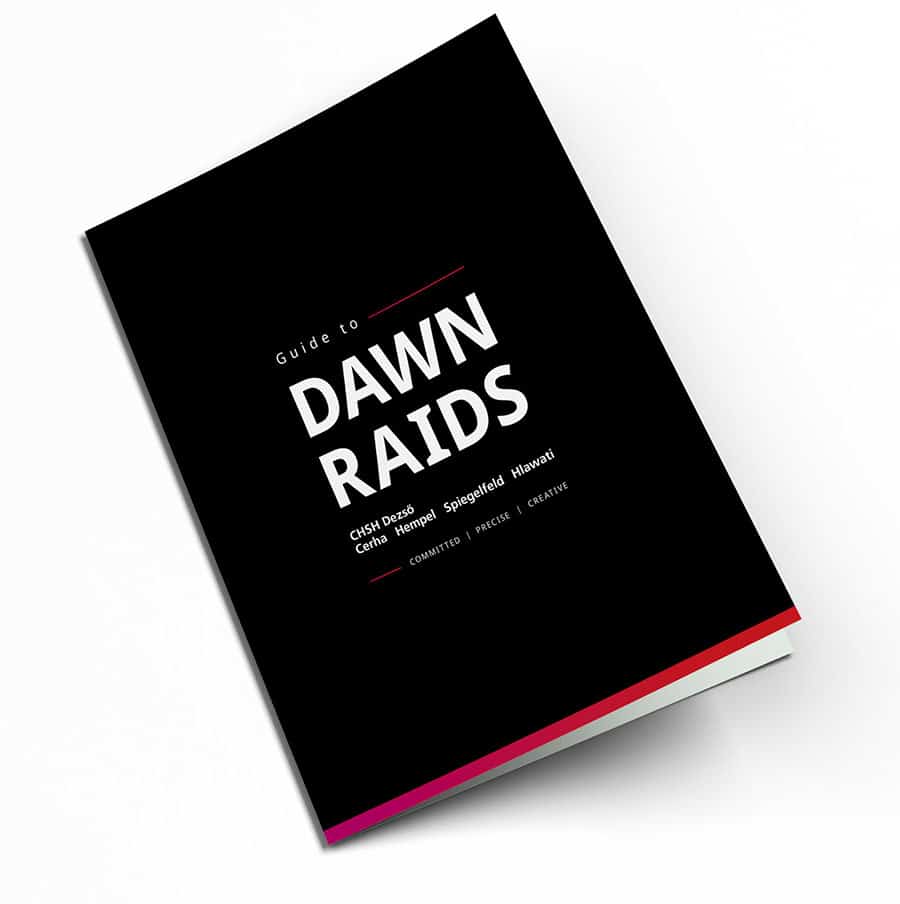The GVH expects continuous cooperation, companies may have to pay for changing their minds
The Hungarian Competition Authority (GVH) increased the fines imposed on companies that were involved in the Danube shipping cartel and challenged the GVH’s decision in court despite having received leniency. The GVH increased the fine on the grounds of a lack of full, good faith and continuous cooperation, despite the fact that the companies had only challenged the legality of the procedure. It is therefore advisable to pay attention to what is and is not allowed, even if the GVH previously appeared to accept offers of cooperation from infringers who had been caught in the act.
Background – the Danube shipping cartel:
In July 2021, the GVH opened an investigation into a suspected cartel in a public tender that had been announced by the Budapest Transport Corporation (BKV) regarding the operation passenger ships on the Danube. The Authority found that the statements of some bidders were practically identical word for word, which is generally a good indication of cartel behaviour. It later emerged that the companies had shared their bid prices before submitting their tenders and that the tender documents had been prepared by an employee of one of the companies. In addition, two of the four companies (which were members of two company groups) were only established a few days before the deadline for the submission of the tenders.
Given the clarity of the situation, all four companies (and two company groups) applied for leniency, i.e. they admitted their “guilt”, helped the GVH uncover the cartel and voluntarily provided the evidence against themselves, thus facilitating the investigation. In the light of their cooperation, the GVH reduced the fines of the cartel members by almost a third and finally imposed a total fine of only HUF 6.5 million (the fine seems light because it is never determined primarily by the gravity of the infringement but by the turnover of the companies involved – in this case, the companies concerned were small).
Promises broken – the GVH’s press release:
The GVH issued a press release on 17 July 2023, announcing that they had withdrawn the 30% fine reduction for the cartel members. The GVH stated that the companies may have admitted the infringement, but by subsequently challenging the Authority’s decision on the infringement in court they made it clear that they had no intention to cooperate in the procedure. The Competition Act requires companies to cooperate fully, in good faith and on a continuous basis in order to obtain favourable treatment, which, according to the GVH, was not the situation in this case, as the companies’ petition to the court showed. As a result, the fine reduction was cancelled and the fine imposed on the shipping cartel participants was increased to HUF 10 million.
Penance pays – what leniency policy is:
Under the leniency policy, companies involved in an infringement can obtain significant benefits if they voluntarily reveal the infringement to the GVH and provide evidence to the Authority to help it close its investigation. The leniency policy can also lead to a reduction of, or even a complete immunity from, fines if companies cooperate with the GVH. The level of reduction depends on each company’s contribution to the detection of the infringement, where a high level of cooperation may lead to a reduction of up to 50% or no fine at all. So the leniency policy can make it worthwhile for companies to cooperate with the GVH, while it obviously makes the GVH’s job a lot easier.
The Competition Act sets out a number of requirements as conditions for the application of leniency policy, such as the admission of the infringement, cessation of participation in the infringement or refraining from destroying evidence. In the shipping cartel case, the GVH did not say that these conditions had not been met; it only questioned that the cartel members had any intent to cooperate, which had to be bona fide, full and continuous. The most important elements of the cooperation obligation are set out in the Leniency Notice published by the GVH, including the need for infringers to be available to the authority at all times, to provide information requested by the GVH in a timely manner and to refrain from destroying evidence.
It is important to point out that companies do not have to waive their right to legal remedies while applying for leniency (unlike, for example, in a settlement procedure, where a company under investigation by the GVH does not have to present self-incriminating evidence, but can expedite the investigation by admitting the infringement and waiving its right to a remedy). For example, if a company that participates in the leniency programme disputes the level of the fine imposed on it or has concerns about the legality of the procedure, it has the right to seek legal remedy under competition law without the cancellation of the fine reduction received under the leniency policy. Obviously, this does not mean that it can dispute the existence of an infringement that it has already admitted.
When it is legitimate to raise a further defence – legal remedies in leniency proceedings:
An important factor to consider in the shipping cartel case is that publicly available information suggests that the cartel members only disputed the legality of the procedure and not the fact that the infringement had taken place, which they had previously admitted. The GVH itself expressly stated in its press release of 17 July 2023 that the remedies against its decisions were always guaranteed by the Competition Act (including in the case of leniency proceedings), and even highlighted judicial control over administrative decisions as an important criterion of legal certainty.
The GVH argued that the companies’ disputing of the legality of the procedure in their lawsuit demonstrated a lack of continuous, good faith and full cooperation. However, the prohibition of “disputing the legality” of a procedure is not defined in the Competition Act or the Leniency Notice as a criterion for the application of leniency. Cooperation is a relatively broad term, but the Leniency Notice does identify a number of circumstances which, while not exhaustive, may help to define the requirements for cooperation. According to the Notice, the GVH expects leniency applicants to fulfil these conditions in particular, i.e. the fulfilment of these conditions does not in itself constitute a condition for leniency, but their absence may exclude the granting of favourable treatment. However, it is important to note that the Notice does not suggest that an act such as disputing a GVH decision would prevent the relevant company from being considered cooperative. In the GVH’s words, the cartel members “made it clear that they had no intention to cooperate during the procedure”, which is a statement that we believe will be difficult to prove simply on the basis that the companies went to court to dispute the legality of the procedure. Proving intent, and in particular past intent, in administrative litigation is likely to be quite difficult in any case.
Therefore, the GVH has not only made a questionable decision on the leniency requirements in the Danube shipping cartel case, which could discourage infringers from cooperation in the future, but also seems to want to limit infringers’ ability to seek legal remedies. Even though the GVH has highlighted the possibility of appealing against its decisions as an important element of legal certainty, the decision may cause leniency recipients to fear that, due to the uncertain interpretation of the relevant rules, a possible challenge to a decision made at the end of an unlawful procedure could also serve as the basis for the GVH to cancel its leniency awards. Even though neither specific statutes nor soft law prohibits disputing a GVH decision that may in fact be open to such a dispute due to procedural errors on the part of the GVH, the threat of a heavier fine may act as a disincentive for companies to exercise their fundamental rights as clients in an administrative procedure. In our opinion, it will therefore be of particular importance to see how the administrative court that is likely to rule on the case decides the issue and where it draws the – now disputed – line between the cooperation requirement and the exercise of fundamental procedural rights.
The GVH’s press release also points out that the cartel members’ lawsuit may also raise concerns in the field of public procurement if they wish to take part in a self-cleaning procedure under the Public Procurement Act in order to be exempted from the sanction of being prohibited from participating in public procurement on the grounds of their cartel membership. According to the GVH, it will be very difficult in the future for companies that, such as the participants in the shipping cartel, dispute a GVH decision based on their own leniency application to benefit from the possibility of self-cleaning. However, based on the text of the Public Procurement Act, self-cleaning is not conditional on either the admission of an infringement or a waiver of the right to appeal, but only on the infringers’ active cooperation during the GVH’s proceedings. The Public Procurement Authority’s practice of only accepting participation in a leniency or settlement procedure as “cooperation” required by the Public Procurement Act, which is supported by the GVH in self-cleaning procedures, raises concerns it itself, as this does not follow from the text of the law or international case law. The GVH’s communication also points in this – in our opinion – wrong direction.
Summary
The Competition Act and the GVH’s Leniency Notice clearly set out the conditions under which a company can benefit from leniency. However, there is no indication in either that it would constitute a breach of the duty to cooperate if a company were to file a lawsuit in order to dispute the legality of the procedure. As the lawsuit filed against the decision adopted in the shipping cartel case did not dispute the recognition or the existence of the infringement, but only the legality of the procedure, it is questionable whether the GVH’s position will be defensible before the administrative court. If the GVH’s position prevails, companies involved in leniency programmes will be more reluctant to seek legal remedy, as the GVH could consider this as a refusal to cooperate, which could also mean heavier fines for them. Ultimately, this weakens judicial control over regulatory authorities, which is the most important guarantee of legal certainty, especially in one-level administrative procedures.
Authors: dr. Márton Kocsis and Márton Tenczer



